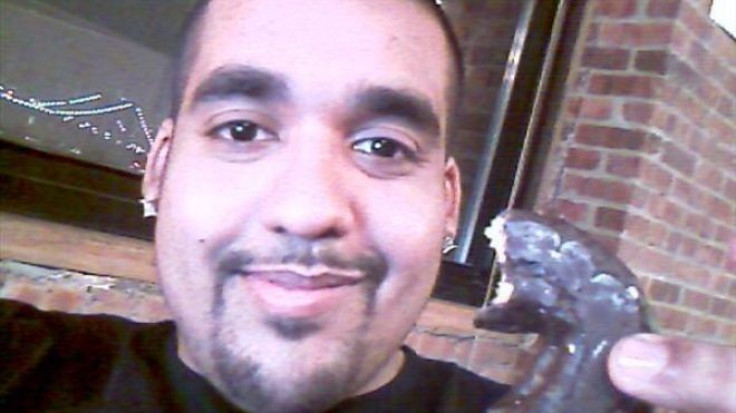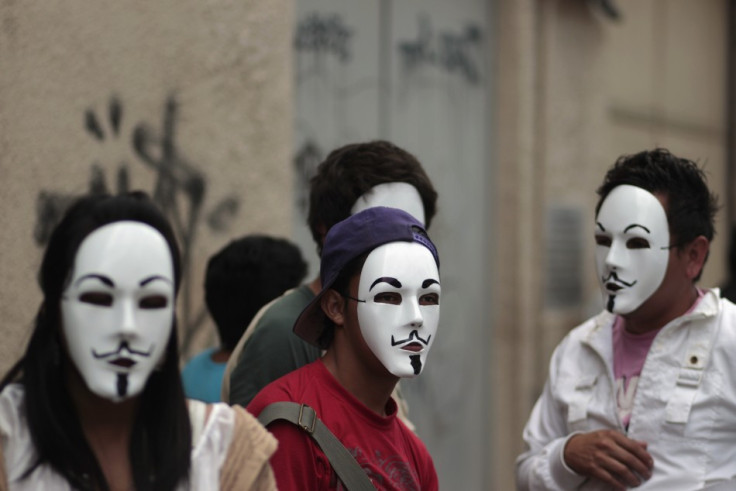Anonymous Hacktivists: 'Bigger and Stronger Than Ever'
IBTimes UK speaks to an Anonymous member who tells us that the collective is now a global operation with cells in at least 50 countries, and it is "bigger and stronger than ever."

Anonymous calls itself a "non-violent resistance movement consisting of a global collective of autonomous individuals." It grew out of the notorious /b/ forum on the 4Chan website, and began to first gain prominence through its support of Wikileaks and the uprising in Tunisia.
However it wasn't until 2011 that Anonymous came to global prominence and most of the world sat up and took notice of this group which uses the Guy Fawkes mask as its identifying symbol. Attacks on the likes of Sony, the FBI and the UK's Serious Organised Crime Agency (SOCA) meant Anonymous was making headlines and attracing the attention of governments and police forces around the globe.
As a result of their operations in 2011, Anonymous was listed earlier this as one of Time's 100 most influential people.
Since those high profile attacks, and the revelation earlier this year that one of the group's leading members was working with the FBI, casual observers may have thought Anonymous activity has slowed down and the group's influence was petering out.
Volume
Speaking to a member of Anonymous however, you quickly realise this is simply not the case. According to the Anonymous member I spoke to, the volume of activity by the collective in 2012 far exceeds that which took place in 2011 "by an order of magnitude."
The spokesperson said Anonymous was "bigger and stronger than ever" with the volume of those "in training" through the group's New Bloods channels and forums tripling in 2012.
Anonymous has even gone so far as to produce training manuals for new recruits with some members dedicating themselves full time to training these newcomers.
While Anonymous may have made the headlines in 2011 for its attacks on high-profile targets like Sony, the FBI and the Serious Organised Crime Agency (SOCA), it also made the headlines for another reason.
Back in March of this year, it was revealed that one of the most well-known members of Anonymous, Sabu, had been working for the FBI helping identify fellow members of Anonymous.
However this event has not deterred people from joining apparently, and according to the collective, it has actually helped recruitment.

"Every arrest affects Anonymous, but not by lessening interest in joining the collective. In fact high profile arrests tend to have quite the opposite effect, actually increasing the volume of people interested - especially amongst those who are young and rebellious and attracted to things that are taboo," the spokesperson said.
Arrests
Arrests like this one, along with a string of high-profile arrests which took place this year in relation to the LulzSec attacks, also affect how members think about their own security and anonymity online:
"The affect that these high profile arrests have is that it causes those in the collective to pause for a time and harden their personal security and op security."
While Anonymous may be seen by many as a US and UK-based organisation, that is simply no longer true. Anonymous is growing and most of that growth is in regions like Asia, the Middle East and South America.
According to the person I spoke with, there are at least 50 distinct Anonymous national cells which are organised enough to have a website, Twitter account and an individual, stylised logo. This number is up from just three in 2010 and around 15 last year.
While high-profile attacks on multinational companies or western governments may not be happening as regularly as last year, these national cells are carrying out much more focused attacks on local targets.
"These national cells are extremely active taking on issues within their own countries. For instance, Anonymous Uganda has been spear-heading a massive fight against the gay criminalisation laws; Anonymous Philippines recently fought a huge battle against their recent cyber-crime bill and actually won; Anonymous Paraguay is extremely active organizing and fighting for the massive land-reform protests on-going in that country."
However the spokesperson also admitted that while there was enormous growth in numbers in new regions, the pace of growth in the UK has slowed.
Global

The global nature of Anonymous means that targets being attacked are diverse and sometimes lead to clashes within the collective itself.
Recently one Anon, going by the name Anonymous Own3r, who calls himself the security leader of Anonymous, was threatened by the Anonymous-affiliated Fawkes Security collective. Fawkes Security accused Anonymous Own3r of carrying out "false attacks" against high-profile companies to make a profit.
It is the very nature of Anonymous which makes this type of in-fighting inevitable. With so many members coming from so many different backgrounds, it is impossible for everyone to always agree.
Process
Therefore the process of choosing which targets are valid and which are not seems confusing from the outside. So we asked Anonymous how it works:
"The 'process' of gaining consensus in Anonymous is a bit difficult to describe. Sometimes targets chose themselves, in the sense that they are so blatant and obvious that consensus is more or less instant. One example recently would be Israel announcing they had plans to shut down the Internet in Gaza.
"Other times, the consensus must be built by those Anons [members] who desire a certain action or operation. One academic described Anonymous as a "do-ocracy." You simply put your Op or action together, get it organised and moving - and then try and "sell" it to the rest of the collective. That is where the debate can come in, especially if the action or operation being proposed is controversial in any way.
"Finally, there are 'spheres of influence' within Anonymous. Sub-groups and individuals who through their hard work, dedication to the principles - and time spent in the movement, have become well respected within the collective. Their ideas about an action or operation can often lead to it being accepted more readily by the 'rank and file' of the collective."
It is the admission of the presence of the "spheres of influence" which is the most interesting aspect of the description of how Anonymous goes about choosing its targets.
Leader
Anonymous has always said the group doesn't have any leaders, in the traditional sense of the term. There is no hierarchical structure, no one to tell the newcomers what they should do.
This has always sounded like an ideal, an aspiration which in reality isn't necessarily true. Indeed, Rob Rachwald security researcher at Imperva, believes the group is waiting for a new leader to emerge:
"The key question is will there be another person who rises up and decides to take a leadership position [within Anonymous] and if that does happen then you'll see another LulzSec-style rampage." Rachwald
Another issue which the global nature of Anonymous throws up is the dilution of the ideals of the collective. Anonymous has three basic principles which all those affiliating themselves with the collective need to follow:
- Do not attack the media
- Do not attack critical infrastructure - such as communications networks, power grids - or hospitals
- Work for Justice and Freedom - especially with regards to freedom of information and the internet
The Anonymous spokesperson I talked to believes the idea of Anonymous is so simple and basic that you cannot really fragment it. When I asked if the collective itself could be fragmented due the proliferation of separate national cells, the spokesperson said:
"These cells don't lead to fragmentation of Anonymous rather they lead to specialisation. It is very difficult for any group of activists to keep an eye on the freedom of the Internet and human rights abuses in every country of the world. So, by having these unique national cells, who are part of the local culture and know the language - they can police their own territories and sound the alarm to the global collective if there is a dire need."
Anonymous remains an elusive, ephemeral group of disaffected people around the globe. The simple ideals which we behind the groups creation may have been mudded somewhat in recent years, but it seems clear that Anonymous is going nowhere and it is now a worldwide movement with the ability to influence political and social change on a grand scale.
"The bottom line is there is never a day that goes by where there are no articles on us published, we literally make the news somewhere in the world every single day."
© Copyright IBTimes 2024. All rights reserved.






